
The Media Show
BBC
Social media, anti-social media, breaking news, faking news: this is the programme about a revolution in media.
- 56 minutes 51 secondsReporting the LA Fires, AI Michael Parkinson, US TikTok ban approaches
We talk to reporters in Los Angeles about the challenges of covering the fires there. As the government prepares to begin the charter renewal process which will decide the future of the BBC, one option being discussed is mutualisation. We explore what that could look like. A new podcast features celebrities interviewed by a reincarnated AI Michael Parkinson. We meet the team behind it. We get an update on the possibility of Tiktok being banned in the US, plus sift the TV industry’s viewing data for Christmas to see what it tells us about the kind of TV we all want to watch.
Presenter: Ros Atkins Producer: Simon Richardson Assistant Producer: Lucy Wai
Guests: Jonathan Hunt, Chief Correspondent, Fox News; Emma Vardy, LA Correspondent, BBC News; Allison Agsten, Director, USC Annenberg’s Center for Climate Journalism and Communication; Caroline Frost, Columnist, Radio Times; Lara O'Reilly, Senior Correspondent, Business Insider; Tom Mills, Chair, Media Reform Coalition; Benjamin Field, Executive Producer, Deep Fusion Films
15 January 2025, 5:20 pm - 57 minutes 10 secondsUncovering the grooming gangs, Meta ditches fact checkers, Grand Theft Auto 6
We talk to Andrew Norfolk, one of the first journalists to report on the grooming gangs story, an issue now in headlines around the world because of the interventions of Elon Musk. Nazir Afzal, former prosecutor explains how journalists helped advise the Crown Prosecution Service about the case. Meta’s decision to scrap US fact-checkers in favor of user-led "community notes," has proved controversial. We find out why. We ask what journalists in the so-called legacy media can learn from news influencers on TikTok. Plus get the latest on one of the most hyped releases of the year (if it happens) Grand Theft Auto 6.
Guests: Andrew Norfolk, Former Chief Investigative Reporter, The Times; Nazir Afzal, former chief prosecutor for the North West England region; Julia Angwin, journalist and fellow at the Harvard Kennedy School; Angie Drobnic Holan, Director, PolitiFact; Joey Contino, TikTok news influencer; Alessandra Galloni, Thompson Reuters editor-in-chief; Vic Hood, games critic Producer: Simon Richardson Assistant Producer: Lucy Wai
8 January 2025, 6:15 pm - 56 minutes 51 secondsPR v journalism, Post Office drama one year on, predictions for 2025
A New Years Day programme where we look forward and back. The Media Show teams up with Radio 4's crisis communications podcast, When it Hits the Fan, to discuss what the big stories of the year tell us about how journalists and PR professionals interact. It’s a year since the hugely influential ITV drama Mr Bates vs The Post Office brought the plight of hundreds of sub-postmasters and mistresses wrongly accused of fraud into our living rooms. We hear how those affected have approached their relationship with the media since then. Plus we assemble a panel of media experts to get their predictions of major trends we'll see in 2025.
Guests: David Yelland and Simon Lewis, presenters, When it Hits the Fan; Rebekah Foot, Chair, Lost Chances; Madhumita Murgia, AI Editor, FT; Charlotte Tobitt, UK Editor, Press Gazette; Rebecca Jennings, Senior correspondent, Vox
Presenters: Katie Razzall and Ros Atkins Producer: Simon Richardson
1 January 2025, 5:13 pm - 56 minutes 35 secondsCNN Syria Report, Health Misinformation, Time Person of the Year
We discuss why CNN is under pressure after a viral news report from Syria turned out not to be all it claimed to be. As ABC News settles a defamation lawsuit with Donald Trump for $15m, we look at what it means for journalism. Also on the programme, a BBC World Service investigation has found that Steven Bartlett’s Diary of A CEO is amplifying harmful health misinformation with little or no challenge. We hear why health and wellness content has proven so popular on podcasts and social media. One half of the Youtube comedy group Map Men reveal how they turned their passion for cartography into a global phenomenon. Plus the editor-in-chief of Time Magazine tells us why they have selected President Elect Trump as their Person of the Year.
Guests: David Folkenflik, Media Correspondent, NPR; Katie Fallow, Deputy Litigation Director, Knight First Amendment Institute at Columbia University; Cécile Simmons, Investigative Researcher, Institute for Strategic Dialogue; Dr Megan Rossi, Dietician, known as The Gut Health Doctor; Nick Hilton, Co-founder, Podot; Jay Foreman, Comedian and YouTube creator; Sam Jacobs, Editor-in-chief, Time magazine
Presenters: Katie Razzall and Ros Atkins Producer: Lucy Wai Assistant Producer: Martha Owen
18 December 2024, 6:29 pm - 56 minutes 50 secondsMedia in the new Syria, how to be an online investigator, can you copyright a vibe?
Kholoud Helmi, co-founder of independent Syrian newspaper Enab Baladi and reporter Edmund Bower discuss the fall of the Assad regime. We hear about claims of misconduct at one of the world’s largest LGBT media platforms. Mia Sato from The Verge and influencer Michael McWhorter examine how online communities responded to the murder of UnitedHealthcare’s CEO and we discuss a controversial lawsuit about the ownership of social media aesthetics. Plus Benjamin Strick, an expert in open-source intelligence, reveals simple tools to uncover the truth behind online content.
Guests: Kholoud Helmi, founder of Syrian independent newspaper Enab Baladi; Benjamin Strick, Investigations Director, Centre for Information Resilience; Josh Parry, BBC journalist, LGBT and Identity; Mia Sato, Platforms & Communities Reporter, The Verge; Michael McWhorter, social media influencer known as Tizzy Ent; Edmund Bower, freelance reporter covering Syria for The Times
Presenters: Katie Razzall and Ros Atkins Producer: Simon Richardson Assistant Producer Lucy Wai
11 December 2024, 6:35 pm - 57 minutes 27 secondsHow to interview Anna Wintour, welfare on TV sets, where to start with Reddit
Vogue Editor-in-Chief Anna Wintour talks to Katie about her career and the new exhibition, VOGUE: Inventing the Runway. As more allegations emerge about the conduct of Master Chef host Gregg Wallace, we hear about the on-set rules supposed to protect participants in reality TV. The civil war in Syria has a sophisticated social media front. We get a briefing now the conflict is back in the headlines. Plus we've a guide to getting started on Reddit, the fastest-growing social media platform in the UK.
Guests: Jo Hemmings, Duty of Care Psychologist; James Ball, Political editor, The New European; Robert H Peck, Associate Professor, The University of Iowa; Charlie Winter, Associate Fellow, International Centre for Counter-Terrorism; Anna Wintour, Editor-in-Chief, Vogue; Hadley Freeman, Columnist, Sunday Times
Presenters: Katie Razzall and Ros Atkins Producer: Simon Richardson Assistant Producer: Lucy Wai
4 December 2024, 5:52 pm - 56 minutes 47 secondsThe end-of-life influencer, Christmas adverts, Mishal Husain leaves the BBC
We talk to journalists and influencers about how they discuss assisted dying. As staff at The Observer vote to go on strike over the plans, its outgoing editor explains why he's against a proposed sale of the Sunday newspaper to Toirtoise media. We ask if department store Christmas adverts still retain their iconic status in 2024 and we consider what presenter Mishal Husain's departure means for BBC flagship news show, Today. Plus we get the latest on the feud between Drake and Kendrick Lamar, which is now heading for the courts.
Guests: Alex Farber, Media Correspondent, The Times; Paul Webster, outgoing Editor, The Observer; Franki Goodwin, Chief Creative Officer, Saatchi and Saatchi; Maisie McCabe, UK editor, Campaign magazine; Julie McFadden, end of life care influencer; Janet Eastham, Social and Religious Affairs Editor, The Telegraph; Mark Savage, BBC Music Correspondent
Presenters: Ros Atkins and Katie Razzall Producer; Simon Richardson Assistant Producer: Lucy Wai
27 November 2024, 6:18 pm - 57 minutes 38 secondsInvestigating abuse in the Church of England, Tyson vs Paul, NYT Games, Leaving X for Bluesky
The resignation of the Archbishop of Canterbury has sparked renewed discussion about accountability in the Church of England. Cathy Newman, Presenter and Investigations Editor, Channel 4 News, reflects on her investigation which triggered it. Mark Stibbe, one of Cathy's original sources, discusses the impact of coming forward with his story. Colin Campbell, Investigative Journalist, BBC News, shares his experience of reporting on cover-ups and systemic failures in the Church’s handling of abuse cases.
Friday’s Netflix boxing match between Jake Paul and Mike Tyson was more than a fight; it was a media moment. Evan Shapiro, Media Commentator and ‘Media Cartographer,’ sees it as evidence of influencer dominance over traditional media. Oliver Brown, Chief Sports Writer, Daily Telegraph, discusses whether such events mark a shift from genuine sport to spectacle.
Games are more than leisure activities; they are now central to media business models. Zoe Bell, Executive Producer of Games, The New York Times, explains how puzzles like Wordle and its new game Zorse contribute to subscription growth. John Halpern, crossword setter, shares insights into his process for crafting puzzles and the timeless appeal of crosswords.
Katie Martin, Columnist, Financial Times, discusses her move from X to Bluesky. She reflects on the challenges of platform migration, the persistence of echo chambers, and the broader implications for media spaces.
Presenters: Katie Razzall and Ros Atkins Producer: Simon Richardson Assistant Producer: Lucy Wai
20 November 2024, 5:21 pm - 57 minutes 51 secondsHow to cover Trump now, Taskmaster creator Alex Horne and who will replace Gary Lineker?
When Donald Trump won in 2016, it boosted cable news and newspaper subscriptions, with some outlets taking an avowedly anti-Trump stance; some even called this the ‘resistance’. What’s going to happen now? We talk to journalists with different approaches. As popular Channel 4 gameshow Taskmaster celebrates its tenth anniversary, creator Alex Horne shares the secrets of its success. And we assess the choices facing BBC Sport after it was announced Gary Lineker will be standing down from Match of the Day.
Guests: Edward Luce, Associate Editor, The Financial Times; Megan McArdle, Columnist, The Washington Post; Katie Drummond, Global Editorial Director, Wired; Alex Horne, creator, Taskmaster; Caroline Frost, columnist, Radio Times Presenters: Katie Razzall and Ros Atkins Producer: Simon Richardson Assistant Producer
13 November 2024, 5:50 pm - 56 minutes 59 secondsTrump's winning media strategy, Observer sale, royal journalism
Donald Trump has pledged to send reporters to jail and strip major television networks of their broadcast licenses. We discuss how the Presidential campaign was covered and what happens next. James Harding of Tortoise Media discusses his plans to buy The Observer, and as a new investigation into the business interests of the Royals is released, we discuss the story, its coverage and the life of the royal journalist.
Guests: James Harding, Editor and Founder, Tortoise Media; Claire Atkinson, Media Reporter, Media Mix Newsletter; Max Tani, Media Editor at news website, Semafor; Alistair Jackson, Investigations Editor, Channel 4; Jennie Bond, former BBC Royal Correspondent; Kinsey Schofield, Host, To Di for Daily
Presenter: Katie Razzall Producer: Simon Richardson Assistant Producer: Lucy Wai
6 November 2024, 5:52 pm - 57 minutes 33 secondsBallots, bias and big tech
This week, The Media Show broadcasts from Washington DC, and asks what the election tells us about the media's role in modern America.
The Washington Post finds itself at the heart of a debate on media impartiality after a reported loss of thousands of subscribers following its decision not to endorse a candidate. NPR's media correspondent, David Folkenflik, joins us to unpack the unfolding crisis.
With tech billionaires wielding significant influence, this election has seen figures like Elon Musk openly backing Donald Trump. Critics argue that big tech’s sway over public discourse has become too potent. Jennifer Huddleston, a senior fellow in technology policy at the Cato Institute, and Marietje Schaake, a former MEP now with Stanford’s Cyber Policy Center, debate the issues.
For over 170 years, the Associated Press has been at the forefront of election coverage, calling winners across the nation. Anna Johnson, AP’s Washington bureau chief, explains how it does what might be "the single largest act of journalism in the world".
Also on the show, Lauren Egan, White House reporter for Politico, talks Ros through her job and what access she gets to the President. And David A Kaplan, former Newsweek legal affairs expert, reflects on the 2000 election—a time when the relationship between the media, the candidates and the public looked very different.
Presented by: Ros Atkins Produced by: Simon Richardson Assistant Producer: Lucy Wai Sound: Ben Martin
30 October 2024, 6:25 pm - More Episodes? Get the App
Your feedback is valuable to us. Should you encounter any bugs, glitches, lack of functionality or other problems, please email us on [email protected] or join Moon.FM Telegram Group where you can talk directly to the dev team who are happy to answer any queries.
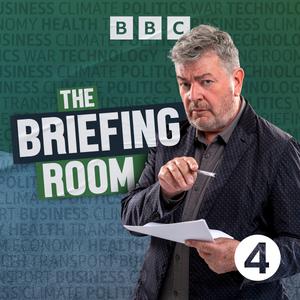 The Briefing Room
The Briefing Room
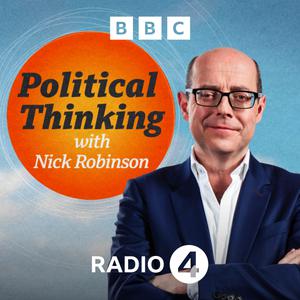 Political Thinking with Nick Robinson
Political Thinking with Nick Robinson
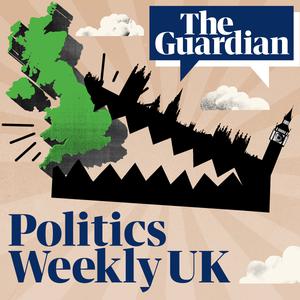 Politics Weekly UK
Politics Weekly UK
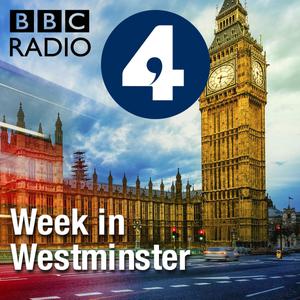 The Week in Westminster
The Week in Westminster
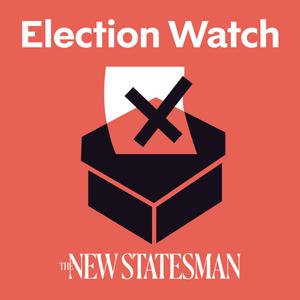 Election Watch: The New Statesman podcast | daily throughout the UK general election
Election Watch: The New Statesman podcast | daily throughout the UK general election
 Red Box Politics Podcast
Red Box Politics Podcast